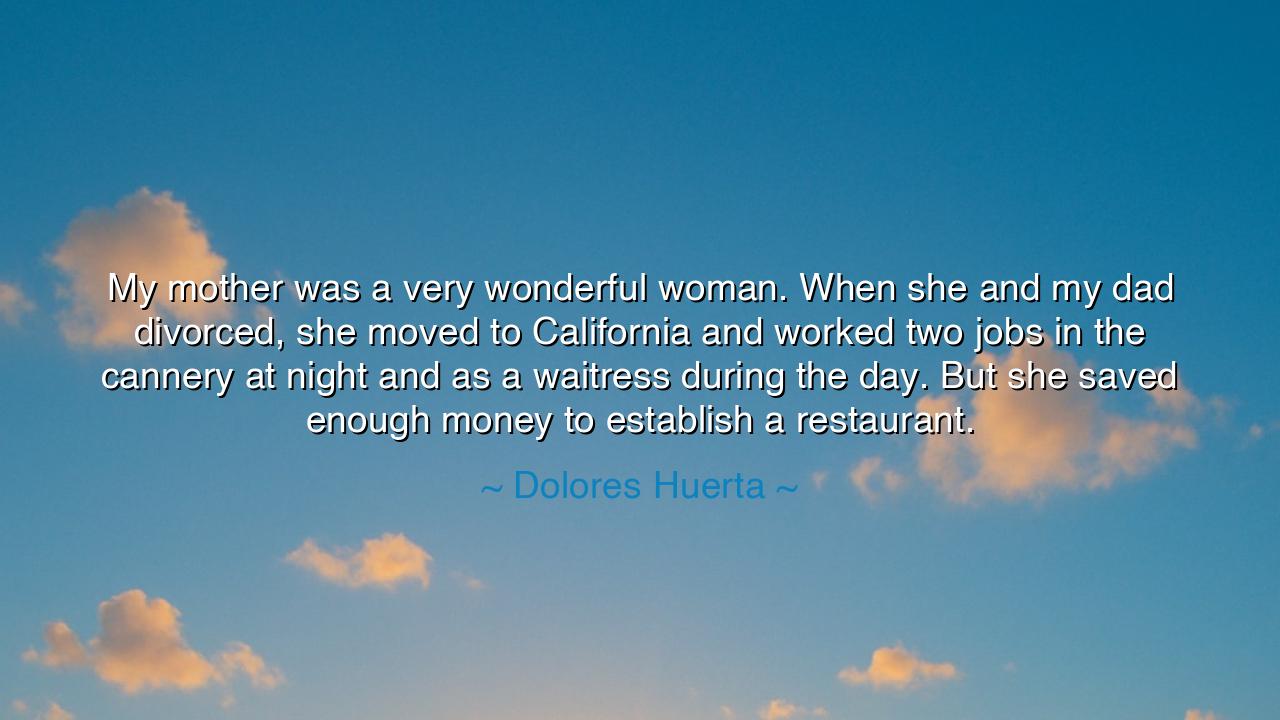
My mother was a very wonderful woman. When she and my dad
My mother was a very wonderful woman. When she and my dad divorced, she moved to California and worked two jobs in the cannery at night and as a waitress during the day. But she saved enough money to establish a restaurant.






“My mother was a very wonderful woman. When she and my dad divorced, she moved to California and worked two jobs—in the cannery at night and as a waitress during the day. But she saved enough money to establish a restaurant.” Thus spoke Dolores Huerta, the great labor leader and co-founder of the United Farm Workers, in tribute to the woman who shaped her courage, compassion, and unyielding will. In these few words, spoken from love and memory, lies a vast landscape of sacrifice, resilience, and inheritance—the sacred transmission of strength from mother to child.
The story begins not in triumph, but in hardship. A woman—alone, divorced, cast into the struggle of survival—chooses not despair, but labor. She works when others sleep, rises when others rest, and turns her exhaustion into fuel for a dream. The cannery at night was not a place of glory, but of cold, endless hours under harsh light, the air thick with the smell of metal and fruit. Yet she endured, and when dawn came, she did not stop. She became a waitress by day, serving others with grace while quietly building her own future. From the outside, she appeared ordinary. But within her burned the sacred fire of those who refuse to be broken.
This is the ancient story of mothers, told through every generation—the invisible heroes who shape history through the quiet power of perseverance. They are not crowned in gold, nor sung in songs, yet they hold up the world with calloused hands. In the life of Dolores Huerta’s mother, we see the spirit that gave rise to the daughter’s destiny. The mother labored to create a life of dignity; the daughter labored to give dignity to millions. Such is the law of legacy: from the courage of one heart, a thousand others awaken.
Consider also the tale of Sojourner Truth, born into slavery but reborn into freedom through sheer will. She walked away from bondage carrying nothing but faith, speaking truth to a nation that would not listen. Like Huerta’s mother, she began with nothing but her voice and her strength. Both women remind us that greatness begins not with ease, but with endurance. The hero’s path is often walked in silence, with tired feet and uncelebrated victories. Yet the fruit of such labor nourishes generations.
The restaurant that Huerta’s mother built was more than a business—it was a monument to perseverance, a living testament that dreams forged in hardship can become sanctuaries of hope. Every plate served was a triumph over poverty, every table a symbol of reclaimed dignity. From her mother, Dolores learned that power does not always come from protest—it can also rise from quiet persistence, from showing up day after day, from refusing to let struggle define you. This lesson would one day guide her in fields and marches, as she lifted the voices of the workers who fed the nation yet lived unseen.
The meaning of Huerta’s words, then, reaches far beyond one family’s story. It speaks to all who labor unseen, all who rise before dawn and work until stars return, all who build futures brick by humble brick. It is a hymn to women of endurance, those who transform scarcity into possibility and pain into purpose. In honoring her mother, Huerta honors every person who has sacrificed for love, for family, for the fragile promise of tomorrow.
And so, my child, the lesson is this: never mistake quiet work for weakness. The strongest souls are often those who labor in silence, who carry the weight of the world not for glory but for love. Do not wait for the perfect condition to pursue your dream—create it, as her mother did, through perseverance and faith. Work not only for survival, but for creation, for the joy of leaving something better behind.
When life grows heavy, remember the image of that woman—tired, determined, her hands rough but her spirit unbroken—standing at dawn in a small California restaurant she built with her own will. That is what it means to be wonderful, in the truest sense of the word. To live with wonder in the face of hardship, to craft beauty from struggle, and to show those who come after you that love, when strengthened by work, becomes legacy.






AAdministratorAdministrator
Welcome, honored guests. Please leave a comment, we will respond soon